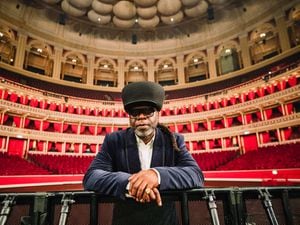Soul II Soul star Jazzie B: I staged my first gig outside home on Silver Jubilee
You don’t have to be a royalist to appreciate the personal service the Queen has given.

For one man, the Jubilee has particular significance. Jazzie B, the creator of Soul II Soul, played his first gig at the Silver Jubilee, in 1977. He’d grown up in a large family and his brothers ran sound systems, playing at clubs and parties in London. Jazzie was keen to follow in their footsteps and in 1977 he staged his first event.
“I did my first gig on the day of the Queen’s Silver Jubilee outside my own house. It was May 13 1977. And then we went to number one and won two Grammies.
“It was one of the most important days of my life. I had my own sound system out playing for a street party to celebrate Queen Elizabeth’s 25th year on the throne. It was me, playing for all my family and friends and all of the neighbours.
“As I switched the sound system on, the whole street was entranced. People were looking at me like I was a hero, I was Emperor Roscoe for the day. I was Fatman Hi-Fi.
“All what was in my head, following my brothers, being at dances, seeing all the crowds, roller skating on a Sunday afternoon, wanting to DJ, wanting to be in the valve amp, wanting to be one of those components… it all came true that day. Playing my first sound system for the street was massive.
“That was it. I never looked back. It was the best buzz of my whole life. I remember it, so clearly. I prepared for that for so long, from the day I was told about the street party to the day of it happening. I was literally thinking it about every day for six weeks or eight weeks.
“I went out and started rigging up outside my own front door. It was like selling lemonade to passing traffic.
“But in my head, it was like Wembley Stadium.
“Soul II Soul was just the way I lived. It was how I am. I realise now that we created something real. We created something authentic. The whole thing started, technically, with that street party in 1977 for the Queen’s Silver Jubilee.
“But I didn’t go legal until 1982. Soul II Soul was art. It was a way of life. It wasn’t about signing record deals and having hits.”
Soul II Soul was an extraordinary movement. Combining fashion, music, art and dance, it took the world by storm – although not until the turn of the 1980s, 12 years after the Silver Jubilee.
In 1989, Jazzie’s soundsystem released a debut album, Club Classics Vol One, which went to number one in the UK and number one on the US R’n’B chart.
The record earned three UK Platinum records and two Platinum Records in the USA as it sold millions of copies around the globe. The follow-up, Vol II 1990: A New Decade, was another number one hit that earned more platinum discs for its creator. The legacy lives on. A soundsystem that played its first gig on the Silver Jubilee played the Royal Albert Hall earlier this year.
“With the early single, Fairplay, we started hitting the mainstream. In a way, we’d been waiting for that. We weren’t trying to reinvent the wheel, we were trying just to become a part of it.
“Then there was Keep On Movin’. You know when you focus a lens; it’s out of focus in the beginning then it gets sharper and sharper. When Keep On Movin’ was a success, that’s what happened with us. Things got sharper and sharper. Some of the people on the collective weren’t as knowledgeable with how the industry was. There’s always going to be people with a different agenda. Soul II Soul were no different. But the difference for me was that I started to see all these incredible flowers starting to bloom. I knew where the business of music was going. It’s like having a 4 by 4 and driving through the rough terrain. That’s how it was with Soul II Soul.
“America had its own polit-tricks and its own ideas. I had the uniform of London, so that was a touchstone for a lot of people around the world. You know, people figured that whatever came out of London must be good. It was certified good stuff. From there, the amount of heavy rotation and press coverage introduced everybody to us. It was about the look, that’s what press were interested in. Then, for us, it was about pursuing that and taking advantage of those situations. But this is all after the fact. We’ve already done it by now. We were on the magic bus and we’d done it. The experiences that it brought were new. So I was spending time in domestic black America. It was around the time of the Rodney King riots and everything else that kicked off there. When I got back to London, I had time to reflect. So much had gone down that it was time to lick my wounds. Everything was changing again. There were various industries closing. You know what, you can almost look at what happened in 2020 and then rewind to that era when we came through, what’s changed? There’s still the same issues at play.
“Technically, we were doing alright.
“When Back to life happened. You know, I was the kid who’d wanted the biggest sound system in the world. Then, we were at number one. We’d got the biggest sound system in the world. Job done. Job done. When you get there, you realise that someone else has been there before. It’s like some explorer and all that lot racing around the world to be the first to this and that and then realising that other people have done it before you.
“The backdrop was the dream. Posters of Ferraris, the Moses poster; growing up, you were aspiring to something. There was a level of naivety with us. They say it takes a village to raise a child and so that put some perspective in. On reflection, the dream come true. The record went to platinum and the dream came true.”





